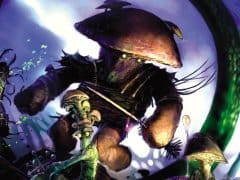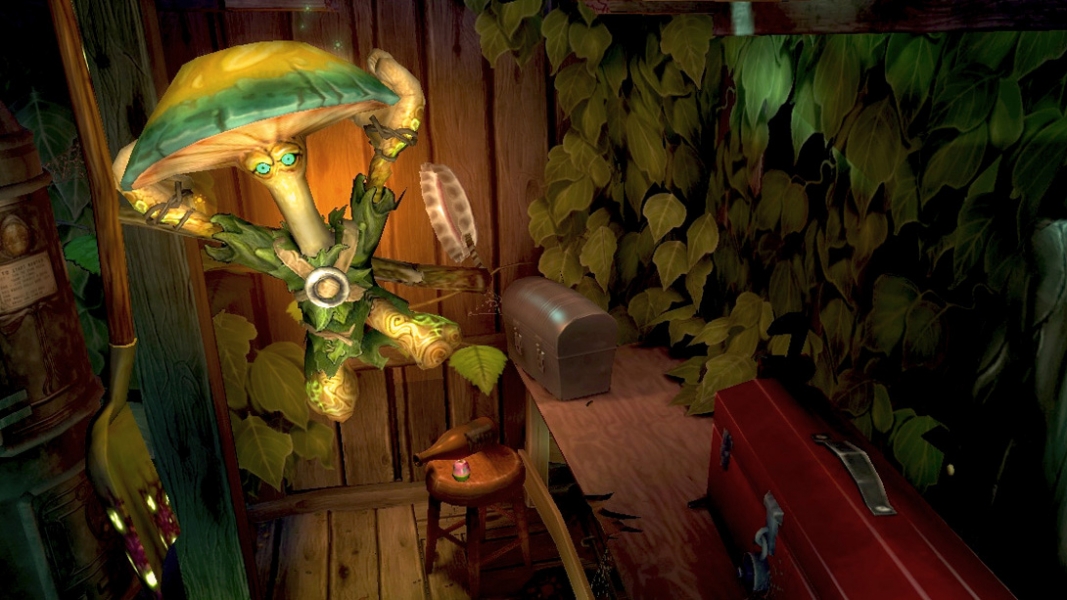You can trust VideoGamer. Our team of gaming experts spend hours testing and reviewing the latest games, to ensure you're reading the most comprehensive guide possible. Rest assured, all imagery and advice is unique and original. Check out how we test and review games here
Mushroom Men: The Spore Wars is an original platforming IP coming to Wii later this year. With the game due out soon we’ll be brining you a series of development diaries highlighting certain areas of the game and some of the techniques that have been used. In this fifth diary, by Matt Piersall, Director and Founder, GL33k, you’ll learn more about the Wii game’s music and sound effects.
Walk before running
These days creating an entire audio package for a brand new IP is rare, that’s why when a chance meeting became a big opportunity the GL33k crew leapt at it. When the project first came up the GL33k team was based in Dallas, Texas, (working with Chris Sabat under the name Okratron 5000). However after we started to realize how deeply involved we were going to be we knew that a move to Austin was on the cards.
The project started with us downloading an extremely early build. We had worked on a lot of games before so we did our typical pass and gave the hero some footsteps, jumping sound, etc. We handed the sounds back over to Red Fly and they implemented them (this was in August of 07). At the time we knew the project was cool but it was so early and our relationship with Red Fly was so new that we stayed very safe and within the bounds of very traditional game audio. Honestly, looking back at it our first round of sounds they were absolutely terrible. I think we did 90 sounds in three days (a typical sound designer does around 5 to 7 a day). It was a rush job and we still didn’t fully understand what Mushroom Men was to become.
Pushing the boundaries
At this point Jimi Barker, Bob Arlauskas and I knew that if Mushroom Men was to become something special we had to break out of the restrictions that most contract game audio companies operate under and truly become part of the team. Sometime around October 07 those two very things happened. The Red Fly guys came down to Dallas to do some recruiting at the Guild Hall and we caught up that evening at a local Mexican Food restaurant. After six or so margaritas we came up with the idea of putting the entire world on a BPM. The idea faded out (of course) until I built a mock up demo using the early build that demonstrated how this would all work. My wife and I came down to Austin for a visit and I showed the Red Fly team the “Metronome”. At that point it was born. The team all got on board with the idea and the real work began.
After our team moved down to Austin we had a lot to do to get the Spore Wars in shape. The day I moved down I had a quick meeting with Les Claypool and gave him the parameters that we were working under (120 BPM). We began creating assets for the newly developed areas and began “abusing” the metronome features. At first I was hesitant to make the metronome uses obvious but I found out in time that it didn’t really matter. In fact I found that the more obvious I made it the better the aural experience was.
In Mushroom Men all of our world sounds are rhythmic. In fact they almost create a song amongst themselves. Mike Behrman did a great job of scripting our assets in and using the metronome despite an INCREDIBLY complicated process that is required to get things to work. Once we really started going we ran in to an incredible amount of technical hitches. One of the main issues was running out of voices. Think of a voice in a game much like that of a synthesizer. If you reach the limit the oldest sound dies out (polyphony), our problem came with realizing that a random sound would die out. Jeff Lake and Kain Shin did a fantastic job of meeting our needs and even making them top priority. Without their help things like random music drop outs would be a common occurrence.
Mutual Respect
One of the best things about working on this project was that since the developer trusted us and the publisher was so cool about letting the devs do what they wished, we had true freedom to really do whatever we felt was cool and fun for the project. We placed realism to the wayside, took a bit of solace in the idea that this could indeed be our last time to get something this unique to work on and approached the audio from a very “garage band” kind of way. I say that because normally when you work on a game the producer/studio heads/publisher want something they’ve heard before. Red Fly didn’t bat an eyelash at even our wackiest ideas.
The music was a tough beast to tackle. We had Les Claypool create five tracks for the game. The tracks included four tracks for the races and one title track. His music was really cool and really helped drive a lot of interest in the project. He delivered his tracks as well as multi tracked sessions (individual elements) that we used as world sounds, pickup sounds, and base elements for other tracks. Bob Arlauskas and myself composed a good majority of the music. The whole game has somewhere in the neighbourhood of 60 tracks because constant looping music is one of my biggest pet peeves. For our approach we wanted to go with a sort of weirdo psychedelic dub feel. There is a slight reggae feel and Jimi Barkers original basslines gave us a cohesive palette from which to work.
During the initial stages of Mushroom Men production the GL33k crew spent a weekend in Denton TX which is home to a pretty great indie music scene. We rented out the Midlake studio and hired our friends who are in the band to create source. Over the course of the weekend we established many of the main themes that are pervasive. We sat on the source material for a very long time with the intention of approaching the music in remix producer fashion. It wasn’t until we were in Austin and we made a quick trip to buy some toy instruments that the music truly came together (including a nice voyage to build a bum kit).
Arranging the music
The actual arrangements of the music took roughly four months. We had literally spent eight months in pre production. Once we had Les Claypool’s music in hand, a few gigs worth of studio source, student instruments, and a near fully playable game we began the true composing and arranging. It wasn’t the optimal way to go but we got to actually see the context in which we were creating for, which sped up the process significantly. Oh and Bob wrote an Epic final boss track a week before we were done!!
For the voices we knew from the beginning that we didn’t want English dialogue. We felt it would take the player out of our surreal world and make it too “Saturday morning”. We originally contemplated going with an Animal Crossing approach (tiny voice bits played back in Engine based on text display) but after Okami (a GREAT sounding game, just never liked the voices) we chose to get voice actors to mimic a fake language. My friend Chris Sabat got the actors together. Chris has been a voice director for a long time and is an incredible voice actor himself. Chris helped direct the actors based on early dialogue that Eric Brach had written and we pieced together phrases to make up the language.
Extra effects
The sound design for Mushroom Men was a very organic process. I said earlier that our original approach simply didn’t work. We ended up approaching the traditional elements by attempting to create iconic sounds. Our final result ended up being much more representative than realistic. Pax’s heal sound was originally a temp sound for a mini game. It’s a short nod to the 8-bit days and the more I heard it the more I liked it. The same is true of the resurrection and death sounds for Pax (which Kidko/Bob did) the death sound isn’t too punishing and the resurrect sound is very refreshing. The damage sounds were actually incredibly easy to make but to come to the final conclusion took forever. In a game the damage sounds are often some of the most frequently heard sounds within a game. I tried the traditional damage technique but it simply got annoying. We ended up recording a drummer friend of mine (McKinzie Smith of Midlake) and running his drums through a series of dub FX. Once that source was there it was the perfect element to mix with the more traditional damage sounds.
The creatures in Mushroom Men were a good mix of recorded voice actors mimicking the creatures and a Kyma patch which triggers samples based on volume and pitch. Kyma is a dedicated sound computer made famous by Ben Burt of Star Wars fame. This technique has been done before (I’ve done it on a game that I won’t mention but it rhymes with Petroid Mime Free) but it was definitely the route to go. We were extremely limited on memory and I really wish that the creatures felt more alive but the most important aspect is there (player feedback). In the end the creature sounds did their job and the player can definitely distinguish between a pain sound and an attack.
I mentioned earlier about the world sounds or environmental sounds before we moved to Austin we had made a few trips out in to nature (one was at a camping bachelor party,,, woot) we armed ourselves with Fostex FR2’s and captured a great amount of source. Again we sat on the source until we had the context of the game in mind and once the pieces fell together we began creating. Our process for the world sounds is unique to this game. We took our source recordings and placed them in Ableton Live. Using the warp markers we created rhythms out of all of the individual sounds and placed them within the world. Jeff Lake (programmer at Red Fly) created a way in which we could place an emitter (an object that emits light, sound, or FX) and put it on beat starting on whatever measure we wanted. This allowed us to make techno beats out of crickets and place them amongst the grass near where Pax travels. We later extended this to working with the particle effects designers (Dustin Dobson, Damon Waldrip) by giving them source sounds to create fx to.
We fought a lot of battles during the production cycle, thankfully it was mainly with technology. The Wii is a great and unique platform but it does have limitations. In the end you can never create a perfect experience because you’ll always face so many difficulties; time, tech, communication, etc, etc. All in all though, Mushroom Men has been one of my favourite experiences working on a game. It’s fun, the people involved were great and the audio got attention from the programmers and designers which is pretty rare in this industry. I’m gonna go make pancakes now.
Mushroom Men – Rise of the Fungi for the DS will be available across North America & Europe from November, 2008. Mushroom Men – The Spore Wars for Wii will be available across North America & Europe from November 2008.
Mushroom Men: The Spore Wars
- Platform(s): Nintendo DS, Wii
- Genre(s): Action, Adventure, Platformer


/https://oimg.videogamer.com/images/95c2/mushroom_men_18.jpg)
/https://oimg.videogamer.com/images/ebff/mushroom_men_12.jpg)
/https://oimg.videogamer.com/images/1a40/mushroom_men_8.jpg)
